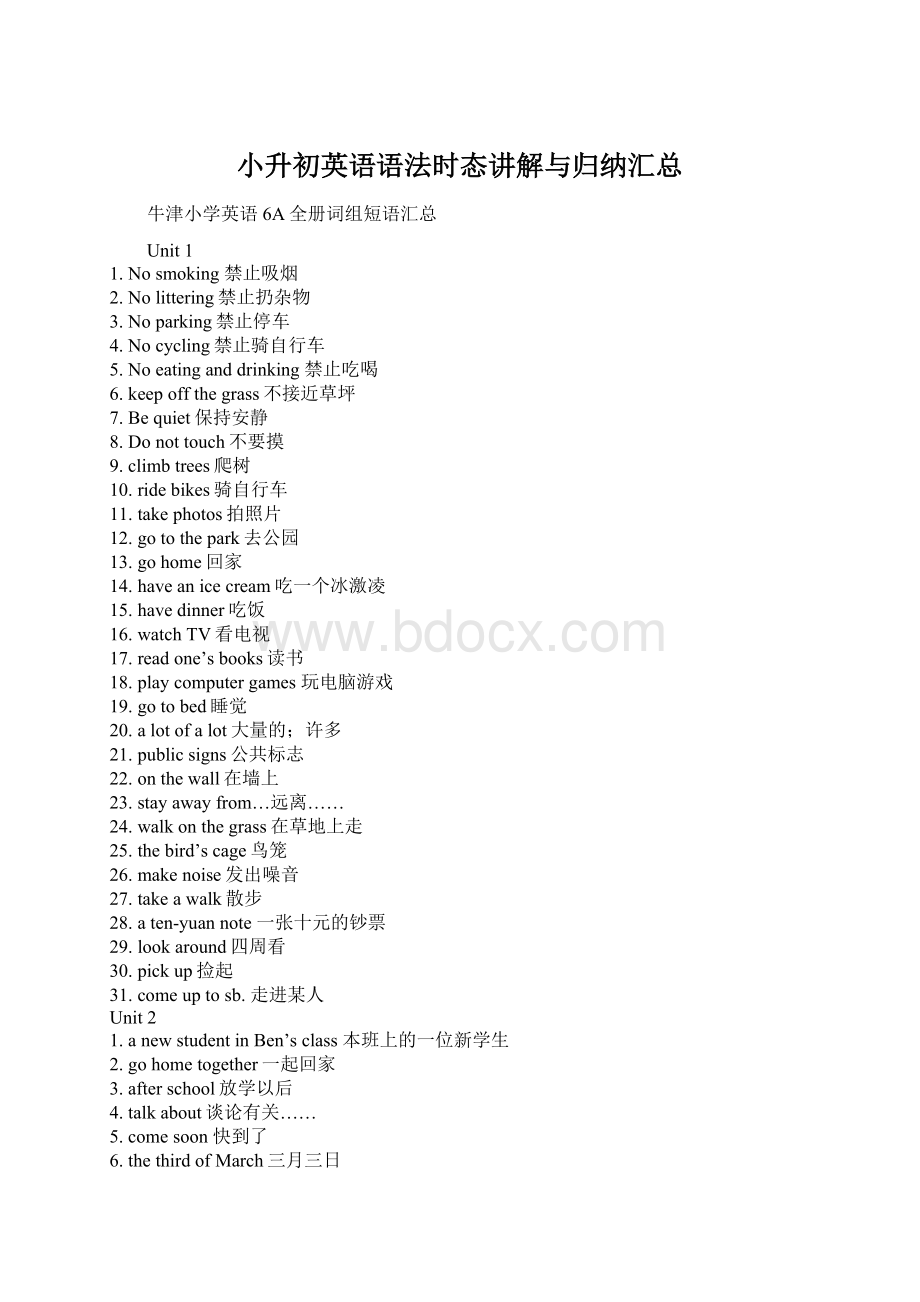小升初英语语法时态讲解与归纳汇总.docx
《小升初英语语法时态讲解与归纳汇总.docx》由会员分享,可在线阅读,更多相关《小升初英语语法时态讲解与归纳汇总.docx(7页珍藏版)》请在冰豆网上搜索。

小升初英语语法时态讲解与归纳汇总
牛津小学英语6A全册词组短语汇总
Unit1
1.Nosmoking禁止吸烟
2.Nolittering禁止扔杂物
3.Noparking禁止停车
4.Nocycling禁止骑自行车
5.Noeatinganddrinking禁止吃喝
6.keepoffthegrass不接近草坪
7.Bequiet保持安静
8.Donottouch不要摸
9.climbtrees爬树
10.ridebikes骑自行车
11.takephotos拍照片
12.gotothepark去公园
13.gohome回家
14.haveanicecream吃一个冰激凌
15.havedinner吃饭
16.watchTV看电视
17.readone’sbooks读书
18.playcomputergames玩电脑游戏
19.gotobed睡觉
20.alotofalot大量的;许多
21.publicsigns公共标志
22.onthewall在墙上
23.stayawayfrom…远离……
24.walkonthegrass在草地上走
25.thebird’scage鸟笼
26.makenoise发出噪音
27.takeawalk散步
28.aten-yuannote一张十元的钞票
29.lookaround四周看
30.pickup捡起
31.comeuptosb.走进某人
Unit2
1.anewstudentinBen’sclass本班上的一位新学生
2.gohometogether一起回家
3.afterschool放学以后
4.talkabout谈论有关……
5.comesoon快到了
6.thethirdofMarch三月三日
7.onthetwenty-secondofJuly在七月二十二日
8.onthe18thofOctober在十月十八日
9.yourbirthday你的生日
10.Let’swaitandsee让我们等一下看看
11.blowoutthecandles吹灭蜡烛
12.asabirthdaypresent作为生日礼物
13.birthdaycake生日蛋糕
14.cometomybirthdayparty来参加我的生日聚会
15.haveabirthdayparty举办生日聚会
16.aVCDofJapanesecartoons一张日本卡通光盘
17.openthedoor开门
18.makeabirthdaycard做一张生日贺卡
19.takeoff脱下
20.blowout吹灭
21.apieceofpaper一张纸
22.folditinhalf把它对折
Unit3
1.SportsDay运动日
2.allthestudents所有的学生
3.beexcited非常激动
4.veryexciting非常令人兴奋
5.lookfor寻找
6.arunningrace一场赛跑
7.letmesee让我看看
8.amomentago/justnow刚才
9.ontheground在地上
10.pickthemupforme帮我把它们捡起来
11.infrontof在……前面
12.nextto紧靠……旁边
13.apairofglasses一副眼镜(单数)
14.arolloffilm一卷胶卷(单数)
15.threediaries三本日记
16.apairofearphones一副耳机(单数)
17.listentomusic听音乐
18.yesterdayevening昨天晚上
19.underthetable在桌子下面
20.trytoremember试图记住
21.intheredbox在红色盒子里
22.closeyoureyes闭上你的眼睛
23.playagame玩游戏
24.withyourclassmates和你的同学们
25.overthere在那边
26.inmyschoolbag在我的书包里
Unit5
1.NationalDay(国庆日)
2.theNationalDayholiday(国庆假期)
3.lastweek/lastyear上个星期/去年
4.aftertheholiday(假期后)
5.gotoschoolearly(很早上学)/early--late
6.intheschoolplayground(在学校操场上)
7.beforeclass(上课前)/before--after
8.watchafilmwithmyparents(和我的父母一起去看电影)/watched
9.afunnycartoon(一部有趣的卡通片)/funny(形容词)
10.visitafarmwithmyfamily(和我的家人一起参观农场)/visited
11.onthefarm(在农场里)
12.watertrees(浇树)/watered
13.pullupcarrots(拔胡萝卜)/pulledup
14.milkcows(挤牛奶)/milked
15.Thatwasfun!
(那是件有趣的事!
)/fun(名词)
16.collecteggs(收集鸡蛋)/collected
17.fruittrees(果树)
18.pickalotoforanges(摘许多橘子)/picked
19.tastethem(品尝它们)/tasted
20.Wonderful!
(太好了!
)
21.gotothefarm(去农场)/went
22.attheweekends(在周末)
23.watchcartoons(看动画片)/watched
24.visitthezoo(参观动物园)/visited
25.listentomusic(听音乐)/listened
26.playfootball(踢足球)/played
27.playvolleyball(打排球)/played
28.cleanthehouse(打扫房子)/cleaned
29.visitLiuTao’sgrandparents(拜访刘涛的祖父母)/visited
30.campingtrip(野营旅行)
31.atacamp(在一个营地上)
32.walkinthemountains(登山)/walked
33.cookalotoffood(做许多食物)/cooked
34.playalotofgames(玩许多游戏)/played
35.gocamping(去野营)/went36.plantflowers(种花)/planted
37.haveagoodtime(玩得很高兴)/had
Unit6
1.getveryexcited变得非常兴奋
2.comeafter在……之后到来
3.NewYear'sDay元旦
4.onNewYear'sDay在元旦
5.atChristmas在圣诞节
6.gotoparties去参加聚会
7.haveabiglunch吃一顿丰盛的午餐
8.atSpringFestival在春节
9.WhatdopeopleusuallydoatSpringFestival?
人们通常在春节干什么?
10.visittheirrelativesandfriends拜访他们的亲戚和朋友
11.eatlotsofdeliciousfood吃许多美味的食物
12.lastSpringFestival上个春节
13.ofcourse当然
Unit7
1.yours 你的(东西);你们的(东西)
2.mine 我的(东西)
3.hers 她的(东西)
4.ours 我们的(东西)
5.infrontof 在……前面
6.beside 在……旁边;靠近
7.answer 回答,答复
8.their 他(她,它)们的(东西)
9.ChristmasDay
10.his
11.wallet
12.You’rewelcome.
13.teapot
14.calculator
15.skateboard
16.hairdryer
17.comb
18.mirror
19.sunny
20.sat
21.back
22.atthebackof
23.getoff
24.got
25.saw
26.seat
27.nobody
28.ask
29.policestation
30.Jim’sfamily
31.Heretheyare.
32.showsb.Sth=showsthtosb
一般现在时
一.意义:
表示经常发生的事情,动作或存在的状态
二.构成及变化
1.be动词的变化。
肯定句:
主语+be(am,is,are)+其它。
如:
Iamaboy.我是一个男孩。
否定句:
主语+be+not+其它。
如:
Heisnotaworker.他不是工人。
一般疑问句:
Be+主语+其它。
如:
-Areyouastudent?
-Yes.Iam./No,I'mnot.
特殊疑问句:
疑问词+一般疑问句。
如:
Whereismybike?
2.行为动词的变化。
当主语为第一,二人称及复数时,助动词为do
肯定句:
主语+动词原形(+其它)。
如:
Weoftenplaybasketballafterschool.
否定句:
主语+don't+动词原形(+其它)。
如:
wedon’tplaybasketballafterschool.
一般疑问句:
Do+主语+动词原形+其它?
如:
Doyouoftenplaybasketballafterschooll?
Yes,wedo./No,wedon't.
特殊疑问句:
疑问词+以do开头的一般疑问句?
如:
Whatdoyouoftendoafterschool?
当主语为第三人称单数时,助动词为does
肯定句:
主语+动词三单式(+其它)。
如:
Heswimswell.
否定句:
主语+doesn’t+动词原形(+其它)。
如:
Hedoesn’tswimwell..
一般疑问句:
Does+主语+动词原形+其它。
如:
Doesheswimwell?
Yes,hedoes./No,hedoesn't.
特殊疑问句:
疑问词+以does开头的一般疑问句?
如:
Howdoesyourfathergotowork?
三.第三人称单数的动词变化规则(只有在第三人称为主语的肯定句中,动词才用三单式)
(1)多数动词直接加s:
runsgetslikescolletstakesplaysclimbs…….
(2)结尾是s,x,sh,ch,o,前为辅音字母,
结尾加es:
watchesteachesgoesdoeswashescrossesmixesbrushes
(3)动词末尾y前为辅音:
将y改为i加es:
study→studiesfly→fliescarry→carriescry→cries
但在y前如果为元音则直接加s:
buyssays
四.时间标志:
always,usually,often,sometimes,every…
现在进行时
一.意义——当表示现在正在进行的动作或正在发生的事。
二.构成:
be(am,is,are)+动词现在分词-ing形式
肯定句:
主语+be+现在分词V-ing(+其他)I’mdoingmyhomeworknow.
否定句:
主语+be+not+动词-ing+其他.I’mnotdoingmyhomeworknow.
一般疑问句:
Be+主语+动词-ing+其他?
Areyoudoingyourhomeworknow?
Yes,Iam.No,I’mnot.
特殊疑问句:
特殊疑问词+be+主语+动词-ing+其他?
Whatareyoudoingnow?
三.现在分词的构成:
(1)一般在动词末尾直接加ing,
(2)以不发音字母e结尾的动词,先去掉e,再加ing,
如skate→skatingmake→makingdance→dancingwrite→writinghave→having
ride→ridingcome→coming
(3)以重读闭音节结尾的动词,中间只有一个元音字母,词尾只有一个辅音字母,应双写末尾的辅音字母,再加ing,如:
puttingrunningbeginningstoppingswimmingshoppingjoggingsittinggettingforgettingletting
四.时间标志——now,句前的look,listen
一般过去时
一.意义:
表示过去某个时间发生的事情或存在的状态.
二.构成及变化
1.Be动词在一般过去时中的变化:
am和is在一般过去时中变为was。
(wasnot=wasn’t)
are在一般过去时中变为were。
(werenot=weren’t)
带有was或were的句子,其否定、疑问的变化和is,am,are一样,即否定句在was或were后加not,一般疑问句把was或were调到句首。
2.行为动词在一般过去时中的变化:
肯定句:
主语+动词的过去式.IwatchedafilmlastSunday.
否定句:
主语+didn’t+动词原形.Ididn’twatchafilmlastSunday.
一般疑问句:
Did+主语+动词原形?
DidyouwatchafilmlastSunday?
Yes,Idid.No,Ididn’t.
特殊疑问句:
疑问词+以did开头的一般疑问句?
WhatdidyoudolastSunday?
三、时间标志:
yesterday,yesterdaymorning(afternoon,evening…)
lastnight(week,month,year…),amomentago,aweekago,threeyearsago…justnow,
一般将来时
一.意义:
表示将来某个时间要发生的动作或存在的状态,也表示将来经常或重复发生的动作。
二.构成及变化:
一般将来时常用的两种结构
begoingto+动词原形:
表示打算、准备做的事或即将发生或肯定要发生的事。
shall/will+动词原形:
表示将要发生的动作或情况,没有太多的计划性,还用来表示意愿
1.begoingto+动词原形
1.肯定句主语+be(am/,is,/are)goingto+动词原形+其它成份
MysisterisgoingtolearnEnglishnextyear.我姐姐准备明年学英语。
2.否定句主语+be(am/is/are)notgoingto+动词原形+其它成份
Iamnotgoingto(goto)thecinematonight.我今天晚上不打算去看电影。
3.一般疑问句 Be(am/is/are)+主语+goingto+动词原型+其它成份…?
Isyourfathergoingtoplaybasketballwithyou?
No,heisn’t.
你父亲打算和你去打篮球吗?
不。
4.特殊疑问句 特殊疑问词(Wh-)+一般疑问句?
WhereareyougoingtospendSpringFesital.?
春节你打算在哪过?
5.注意:
begoingto结构后面习惯上不跟go,come等表位移的动词,一般用该动词的进行时形式表示。
如:
He’sgoingtoNewYorknextweek.下周他要去纽约.
2.will/shall+动词原形
(在书面语中,主语是第一人称时,常用shall,在口语中,所有人称都可以用will)
1.肯定句主语+will/shall+动词原形+其它成份
I(shall)writetohimnextweek.下周我将给他写信。
2.否定句主语+will/shall+not+动词原形+其它成份
Theywon’twatchTVthisevening.今天晚上他们不看电视。
3.一般疑问句 will/shall+主语+动词原形+其它成份
Willyoustayathomewithustomorrow?
明天你和我们呆在家里好吗?
4.特殊疑问句特殊疑问词(Wh-)+一般疑问句
Whenwillyourfatherbeback?
你爸爸什么时侯回来?
三、附:
ShallI/we…常用来征求对方意见,而问对方是否愿意,或者表示客气的邀请,常用Willyou…?
他们的回答比较灵活。
1.Shallwegotothepark?
肯定Sure,let’sgo.
否定No,let’sgotothecinema.
2.Willyoupleasecometomybirthdaypartynextweek?
肯定Yes,Iwill./Sure.
否定I’msorry.I’mafraidIcan’t.
四、时间标志:
tomorrow,soon, nextMonday, nextyear,nextweekend,thisafternoon,thisevening……